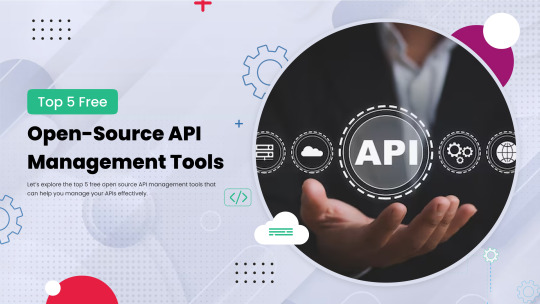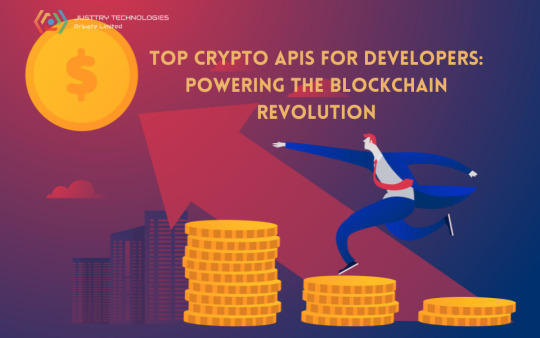#apiprovider
Explore tagged Tumblr posts
Text
0 notes
Text

Enhance Your Application’s Functionality with Expert API Services!
At Connect InfoSoft, we specialize in delivering Superb API solutions:
RESTful API Development/Integration
SOAP API Expertise
Custom API Development
Our team is dedicated to creating seamless, secure, and efficient integrations tailored to your business needs. Let’s make your software work smarter, not harder.
Get your FREE consultation today!
#connectinfosofttechnologies#connectinfosoft#api#apiintegration#apidevelopment#restfulapi#soapapi#customapi#expertapi#apiexperts#techsolutions#softwaredevelopment#webdevelopment#techservices#itconsulting#softwaresolutions#apisolutions#techsupport#techconsultants#itexperts#digitalsolutions#apidesign#apimanagement#softwareintegration#appdevelopment#customsolutions#apiproviders#usa#india#canada
1 note
·
View note
Text
Top 5 Free Open-Source API Management Tools

APIs (Application Programming Interfaces) play a vital role in modern software development, enabling applications to communicate and share data efficiently. As APIs become more prevalent, managing them effectively becomes increasingly important. Open-Source API management tools are essential for controlling, monitoring, and securing APIs. While there are many commercial API management solutions available, there are also excellent open-source alternatives that provide robust features without the hefty price tag.
In this blog post, we'll explore the top 5 free open source API management tools that can help you manage your APIs effectively.
Read more: https://apponward.com/blogs/top-5-free-open-source-api-management-tools
0 notes
Text

Top 50 Cryptocurrency APIs for Developers: Harnessing the Power of Public APIs
In the fast-growing world of cryptocurrencies and blockchain, developers require seamless access to reliable data and functionalities to build applications like wallets, trading platforms, decentralized apps (dApps), and analytics tools. Cryptocurrency APIs (Application Programming Interfaces) are indispensable for developers, offering pre-built tools to interact with blockchain networks, fetch market data, and execute transactions.
Public cryptocurrency APIs play a crucial role by simplifying access to blockchain features, empowering developers to focus on innovation rather than infrastructure. This blog explores the top 50 cryptocurrency APIs for developers, showcasing their key features and use cases to help you choose the best tools for your project.
What Are Cryptocurrency APIs?
Cryptocurrency APIs are software interfaces that allow developers to interact with blockchain networks and cryptocurrency services. These APIs provide access to real-time data, wallet management, blockchain analytics, and much more.
Key Features of Cryptocurrency APIs:
Real-time market data and price tracking.
Blockchain transaction and wallet management.
Smart contract deployment and interaction.
Multi-blockchain support for cross-chain applications.
Trading functionalities for exchanges.
Why Public Cryptocurrency APIs Are Vital for Developers
1. Simplified Blockchain Access
Public APIs eliminate the need to set up complex blockchain infrastructure, providing developers with easy access to blockchain networks.
2. Real-Time Data
APIs deliver real-time updates on prices, transactions, and market trends, enabling developers to create responsive applications.
3. Cost and Time Efficiency
Instead of building functionalities from scratch, developers can leverage pre-built APIs, saving time and resources.
4. Scalability
APIs are designed to handle growing user demands, ensuring your application remains responsive as it scales.
Top 50 Cryptocurrency APIs for Developers
Here’s a comprehensive list of the top cryptocurrency APIs for developers, categorized by their key functionalities.
Market Data APIs
CoinGecko APIProvides price data, market capitalization, and historical data for thousands of cryptocurrencies. Use Case: Building market analytics tools.
CoinMarketCap APIOffers detailed insights into cryptocurrency prices, rankings, and market trends. Use Case: Portfolio management platforms.
Nomics APIDelivers real-time and historical market data with robust accuracy. Use Case: Trading platforms and price prediction models.
CryptoCompare APISupports data for prices, trading volumes, and news aggregation. Use Case: Building trading dashboards.
Messari APIOffers advanced data for market research and financial modeling. Use Case: Crypto analytics tools.
Blockchain Transaction APIs
Blockchain.com APITracks Bitcoin transactions, wallet balances, and block data. Use Case: Bitcoin wallet applications.
BlockCypher APISupports multi-blockchain operations, including Bitcoin, Ethereum, and Litecoin. Use Case: Blockchain analytics and payments.
NOWNodes APIProvides access to full blockchain nodes for over 50 networks. Use Case: Transaction verification and data querying.
Bitquery APIEnables querying blockchain data across multiple chains. Use Case: Compliance and auditing platforms.
Etherscan APIOffers Ethereum block and transaction data, along with smart contract interaction. Use Case: Ethereum dApp development.
Wallet Management APIs
Coinbase APIManages wallets and facilitates cryptocurrency payments. Use Case: Payment gateways and wallet apps.
Tatum APISupports wallet creation, address generation, and blockchain transactions for over 40 networks. Use Case: Multi-currency wallet applications.
Gemini APISecure wallet integration and cryptocurrency transfers. Use Case: Secure payment solutions.
BitGo APIOffers enterprise-grade wallet solutions with multi-signature security. Use Case: Business-oriented wallet platforms.
Celo APISpecializes in wallet management and decentralized finance (DeFi) tools. Use Case: Mobile-first blockchain wallets.
Trading APIs
Binance APIProvides trading functionalities, order management, and real-time market data. Use Case: Automated trading platforms.
Kraken APIEnables trading, market data access, and portfolio tracking. Use Case: Crypto exchange applications.
Bitfinex APISupports advanced trading features and historical market data. Use Case: Trading bots and exchanges.
Huobi APIFacilitates order placement and access to liquidity pools. Use Case: Decentralized trading apps.
Coinbase Pro APIOffers trading and market analytics tools for professional traders. Use Case: Institutional-grade trading platforms.
Smart Contract APIs
Alchemy APIStreamlines Ethereum smart contract deployment and analytics. Use Case: Building DeFi platforms.
Moralis APISimplifies interaction with smart contracts across multiple blockchains. Use Case: Web3 and dApp development.
Infura APISupports Ethereum and IPFS connectivity for decentralized applications. Use Case: Smart contract-based gaming platforms.
Chainlink APIProvides secure oracle services for integrating external data into smart contracts. Use Case: DeFi and insurance platforms.
0x APIOffers tools for building decentralized exchanges and liquidity aggregation. Use Case: NFT and token marketplaces.
Cross-Chain and Interoperability APIs
1inch APIAggregates liquidity across decentralized exchanges for optimized trading. Use Case: Cross-chain trading applications.
Polkadot APIEnables interoperability between blockchains using Polkadot’s relay chain. Use Case: Cross-chain dApps.
Cosmos APISupports interoperability and blockchain communication within the Cosmos network. Use Case: Interconnected blockchain ecosystems.
Ripple APIFacilitates cross-border payments and remittances. Use Case: Global payment systems.
Hyperledger Fabric APIOffers enterprise-grade solutions for permissioned blockchain networks. Use Case: Supply chain and finance platforms.
Additional APIs for Specialized Use Cases
The Graph API: Blockchain querying for dApp developers.
Aave API: Tools for DeFi lending and borrowing platforms.
Uniswap API: Liquidity pool data for decentralized exchanges.
SushiSwap API: Decentralized finance tools for yield farming.
PancakeSwap API: BSC-based DeFi platforms and token trading.
OpenSea API: NFT trading and marketplace tools.
QuickNode API: Blockchain node-as-a-service.
BitMex API: Advanced derivatives trading tools.
FTX API: Cryptocurrency futures and options trading.
Balancer API: Portfolio rebalancing in DeFi.
Choosing the Right API for Your Project
When selecting an API for your cryptocurrency project, consider:
Blockchain Compatibility: Ensure it supports your chosen blockchain(s).
Features: Match the API’s functionalities with your project needs.
Security: Opt for APIs with robust encryption and authentication.
Scalability: Ensure it can handle increasing transaction volumes.
Conclusion
Public cryptocurrency APIs have transformed blockchain development by providing developers with powerful tools to build applications quickly and efficiently. Whether you’re developing wallets, exchanges, dApps, or analytics platforms, the APIs listed above cater to diverse use cases and industries.
Partnering with experienced blockchain development services can further enhance your project, ensuring seamless API integration and scalability. The future of blockchain innovation lies in leveraging the right APIs—make your pick and start building the next big thing in crypto!
Visit : https://justtrytech.com/cryptocurrency-exchange-development-company/
#cryptoexchange#crypto exchange platform development company#crypto exchange development company#blockchaintechnology#cryptocurrency exchange development service#cryptocurrencyexchange#crypto exchange platform development
1 note
·
View note
Text

White Label Panel with Your #Brand Is Now 20% Off
Contact Now : 98045 00091
Visit for more details :www.spayu.co.in
#microatm #b2b #smartbusiness #securepaymentssystem #mpos #highcommision #resellers #whitelabel #aepsreseller #bbps #moneytransfer #apipartner #apiprovider #spayu #adminpanel #Spayuservicesandtechnology
0 notes
Text
Bet365 API Python
For your Sports Betting website, You can take our bet365 API python and also know bet365 API price contact apiproviders
https://apiproviders.com/bet365-api-python.php

0 notes
Text
The Complete Guide To Use An API
What is an API and How is it Used For?

Also referred to as Application Programming Interface, API is aset of functions that allows the applications available in your computer to interact with other services.To execute this interaction, you do not need to know the internal mechanism of it as just a simple command will do the job. Let’s try to understand this with an example. Suppose you need to pay your electricity or any other bill onlinethrough the online mode. In that case, what you will do is refer to the you refer to the bill payment api which will connect you to the in-house payment processor, such as online banking, credit card processing network, etc., and in response, the money transfer apiproviderwill pay your bills in a safe and secured manner. Why are APIs Necessary?
Without an API, the functionality of an applicationstays limited. Also, it increases the development time of that particular application. This is becausethe non-executed functions develop independently. But with API, you can develop application in no time as api binds different applications togetherand help improve thefunctionality of it.For example, the owner of the hotel booking application uses the services of hotel booking api providerwhich help them make a catalogue of rooms with images. The same api gives an opportunity to the users to choose and book/ hotel rooms, thus improving the functionality of the application. Hence it is important to include the APIs into the applications in order to access the features/functions to the fullest.
Advantage of APIs:
Developing an application with an api is a time saving task unlike those implemented applications which take too long to develop. With api, it is more convenient for the user to use the features/capabilities of the application. For example, multi recharge solution, multi recharge api, etc. These APIs if used in your applications of multi recharge solution, will help the app usersto recharge their devices in the fastest time possible.
Types of APIs:
There are four types of APIs available out there, namely: Open API, Partner API, Internal API, and Composite API.
Open APIs: Also referred to as Public APIs, Open APIs are available publicly hence any person can use this without restrictions.
Partner APIs: In order to use these types of APIs, one must have a valid license as they are not openly available for all.
Internal APIs: These are Private APIs and are only used within a particular organization.
Composite APIs: Used to combine distant types of services, thus increasing the execution speed and improving the performance of the application.
Endpoints:
Endpoint is a key aspect that enables an application to interact with the API. It consist of a particular address (for example, https://goole.com/bestrechargeandbookingsolution). If you refer this address then you will get access to the list of best solutions to recharge your device. Usually, the endpoint address you put in takes you to the functionality it provides.
Request Methods
There are four methods to request a command, they are:
GET: It is used to request/get data from a server. Note that, you can only use this method when requesting services from an open api like bus booking api provider, flight booking api provider, etc.
POST: Use it when you need to add more/newdata to the server. For example: add bank account details before using money transfer api provider.
PUT: Used to change existing date. Change the number of passengers on those travel booking applicants that use bus api.
DELETE: When you need to delete the existing information.
How To Start Using An API:
There are some guidelines that one needs to consider while using an API:
· Get an API Key
· Examine API Endpoints
· Create your Application
Last Words:
Know that, every API is dependent upon the service it was built on. So use the one which can provide the services you are looking for.
Sources:- Pay My Recharge
#recharge api provider#bill payment api#money transfer api provider#bus booking api provider#flight booking api provider#multi recharge solution#best recharge commission
0 notes
Text
Ionic Angular Lazy Loading with Child Components
We have already discussed few articles on Ionic. Latest Ionic 3 came up with lazy loading concepts. Changing Ionic apps to use lazy loading significantly boost up the app performance. This actually improves the app speed, instead of loading everything in root application module file. This allows doing the work in sync with when your users want it to happen. This article explains to you how to modify the existing default Ionic app and apply lazy load concepts like working with providers, shared/child components. It process by loading chunks of code such as child components when it’s requested not when the app is loaded. Use this feature and enrich your application. Watch the video, you understand it better.
Install Latest Ionic & Cordova Update your Ionic using following command. Now it supports hotloading with IonicDevApp and lazyloading.
$npm install ionic cordova -g
Video Tutorial - Ionic Angular Lazy Loading with Child Components
youtube
Create Ionic Project with Tabs Let's create a Ionic default tabs project. This comes with default structure wit following compoenents.
$ionic start YourProjectName tabs
Default Project We are applying lazy loading features to this application. Getting started Go to src folder and modify app.module.ts app.module.ts Here we are dropping all the existing page component imports like home, about and contact.
import { NgModule, ErrorHandler } from '@angular/core';
import { BrowserModule } from '@angular/platform-browser';
import { IonicApp, IonicModule, IonicErrorHandler } from 'ionic-angular';
import { MyApp } from './app.component';
import { StatusBar } from '@ionic-native/status-bar';
import { SplashScreen } from '@ionic-native/splash-screen';
@NgModule({
declarations: [
MyApp
],
imports: [
BrowserModule,
IonicModule.forRoot(MyApp)
],
bootstrap: [IonicApp],
entryComponents: [
MyApp
],
providers: [
StatusBar,
SplashScreen,
{provide: ErrorHandler, useClass: IonicErrorHandler}
]
})
export class AppModule {}
Delete Pages Go to project folder and delete all the pages except tabs. We are going to modify the TabsPage later. Regenerate Pages Generate pages using latet Ionic version. This comes with lazy load modules.
$ionic g page Home $ionic g page About $ionic g page Contact
Newly Generated Pages If you notice new page components comes up with Ionic Page Module. This is going to support lazy loading. Create Module for Tabs We need to create the following file. This play key role for lazy loading page. tabs.moudle.ts Create this file inside tabs folder. It is very similar to home.module.ts
import { NgModule } from '@angular/core';
import { IonicPageModule } from 'ionic-angular';
import { TabsPage } from './tabs';
@NgModule({
declarations: [
TabsPage,
],
imports: [
IonicPageModule.forChild(TabsPage),
],
})
export class HomePageModule {}
tabs.ts Drop all the page component imports, instead we are going to use page names and keep page name in quots link HomePage to "HomePage". Here IonicPage module will understand all of these page names.
import { Component } from "@angular/core";
import { IonicPage } from "ionic-angular";
@IonicPage()
@Component({
templateUrl: "tabs.html"
})
export class TabsPage {
tab1Root = "HomePage";
tab2Root = "AboutPage";
tab3Root = "ContactPage";
constructor() {}
}
app.components.ts Some way you have remove TabsPage component and replace the root page with name string "TabsPage".
import { Component } from '@angular/core';
import { Platform } from 'ionic-angular';
import { StatusBar } from '@ionic-native/status-bar';
import { SplashScreen } from '@ionic-native/splash-screen';
@Component({
templateUrl: 'app.html'
})
export class MyApp {
rootPage:any = 'TabsPage';
constructor(platform: Platform, statusBar: StatusBar, splashScreen: SplashScreen) {
platform.ready().then(() => {
statusBar.styleDefault();
splashScreen.hide();
});
}
}
Working with Providers The provider is an injectable component or service. Here you can include the most commonly used functions like HTTP api calls etc. Generate providers using Ionic command and this will take care all the imports in app.module.ts
$ionic g provider Api $ionic g provider User
Note: Watch the video for provider.ts export file. app.module.ts App module will update with new providers. Here you have to include HttpModule for making API calls.
import { NgModule, ErrorHandler } from '@angular/core';
import { BrowserModule } from '@angular/platform-browser';
import { IonicApp, IonicModule, IonicErrorHandler } from 'ionic-angular';
import { MyApp } from './app.component';
import { HttpModule } from "@angular/http";
import { StatusBar } from '@ionic-native/status-bar';
import { SplashScreen } from '@ionic-native/splash-screen';
import { ApiProvider, UserProvider } from '../providers/providers';
@NgModule({
declarations: [
MyApp
],
imports: [
BrowserModule,
IonicModule.forRoot(MyApp),
HttpModule
],
bootstrap: [IonicApp],
entryComponents: [
MyApp
],
providers: [
StatusBar,
SplashScreen,
{provide: ErrorHandler, useClass: IonicErrorHandler},
ApiProvider,
UserProvider
]
})
export class AppModule {}
Working with Shared/Child Components In the Ionic project, the page is nothing but an angular component. Shared/Child component you can import into multiple pages. This comes with HTML template. Ionic command for generting components.
$ionic g component FollowButton $ionic g component DeleteButton
It will auto generate component.module.ts export file. component.module.ts Common import file for all the shared components.
import { NgModule } from "@angular/core";
import { FollowButtonComponent } from "./follow-button/follow-button";
import { IonicModule } from "ionic-angular";
import { DeleteButtonComponent } from "./delete-button/delete-button";
@NgModule({
declarations: [FollowButtonComponent, DeleteButtonComponent],
imports: [IonicModule],
exports: [FollowButtonComponent, DeleteButtonComponent]
})
export class ComponentsModule {}
How to Import Lazy load Child Components You can import shared components for importing comonent.module.ts home.moudle.ts Import ComponentModule export componets file and include it in imports.
import { NgModule } from '@angular/core';
import { IonicPageModule } from 'ionic-angular';
import { HomePage } from './home';
import { ComponentsModule } from '../../components/components.module';
@NgModule({
declarations: [
HomePage,
],
imports: [
ComponentsModule,
IonicPageModule.forChild(HomePage),
],
})
export class HomePageModule {}
home.html Use component selector <follow-button> to call the Follow Button component. Here using name attribute initiating the data to the child compoent. For pusing dynamic data use [name] attribute. Here name is the input key.
<ion-header>
<ion-navbar>
<ion-title>home</ion-title>
</ion-navbar>
</ion-header>
<ion-content padding>
Lazy loading
<follow-button name="home page" ></follow-button>
</ion-content>
Working with Input String Using @Input() module we can read the name attribute value. frined-button.ts Import Input module and declare input string "name".
import { Component, Input } from "@angular/core";
@Component({
selector: "follow-button",
templateUrl: "follow-button.html"
})
export class FollowButtonComponent {
@Input() name: String;
text: string;
constructor() {
console.log("Hello FollowButtonComponent Component");
this.text = "Follow Button";
}
action() {
console.log(this.name);
}
}
frined-button.html Implemented an action for priting input value in console.log
<button ion-button (click)="action()">
Video Tutorial - Ionic Angular Lazy Loading with Child Components
youtube
via 9lessons Programming Blog http://ift.tt/2C47vPi
0 notes
Text
Bet365 API price
To know Bet365 API Price or get Bet365 API Demo or any other query you can contact Apiprovider

0 notes
Text

Justforpay is your #onestop #solution for all your #Banking needs! 🤩 Why wait? Sign up today! Discover more about B2B Portal & API> www.justforpay.co.in #linkinstory Request a free demo. 📱 +91 8882171675 #NexGenBanking #BankingAPI #APIbanking #API #APIservices #APIprovider #APIcompany #Banking #KYCWallet #CashWithdrawal #CashDepsosit #AePS #MoneyTransfer #DomesticMoneyTransfer #DMT #moneytransferservice #fintech #apibanking #apicompany #offer #bestoffer #ootdindia #offeroftheday #novemberoffer #novemberdeal #businessoffers #businessoportunity
0 notes
Text


Why wait? Sign up today!
Discover more about B2B Portal & API> www.justforpay.co.in

#NexGenBanking#BankingAPI#APIbanking#API#APIservices#APIprovider#APIcompany#Banking#KYCWallet#CashWithdrawal#CashDepsosit#AePS#MoneyTransfer#DomesticMoneyTransfer#DMT#moneytransferservice#fintech#apibanking#apicompany#offer#bestoffer#ootdindia#offeroftheday
0 notes
Text

Justforpay is your #onestop #solution for all your #Banking needs! 🤩 Why wait? Sign up today! Discover more about Banking API> www.justforpay.in #linkinstory Request a free demo. 📱 +91 8882171675 ####API ##APIprovider ##Banking #KYCWallet #CashWithdrawal #CashDepsosit #AePS ###DMT #moneytransferservice
0 notes